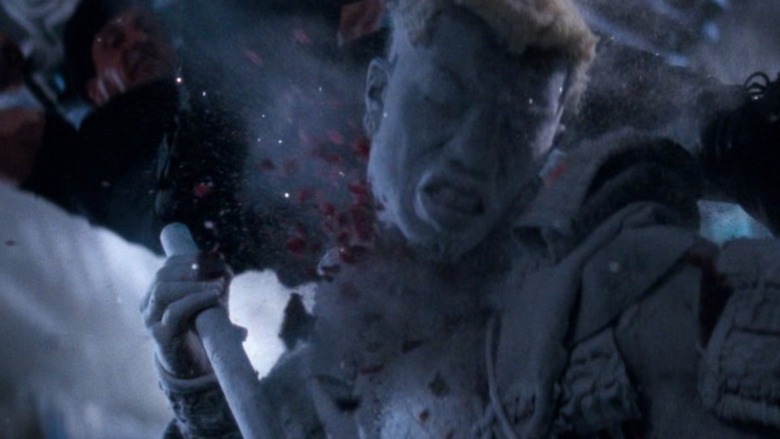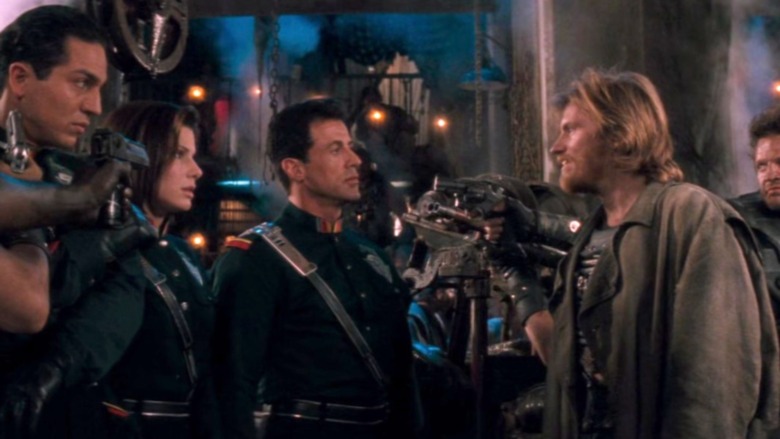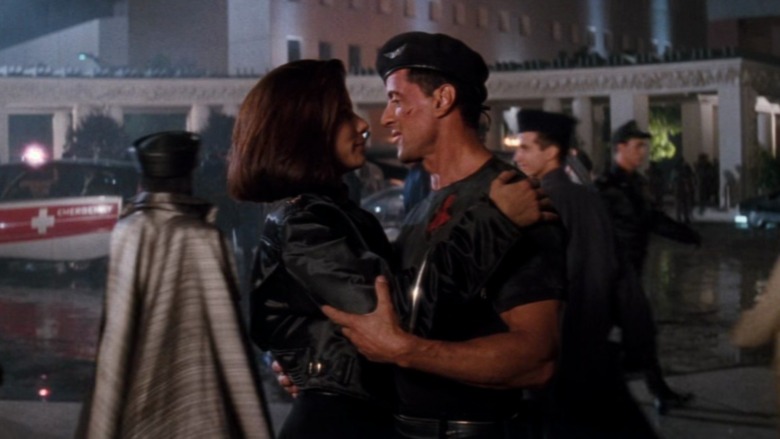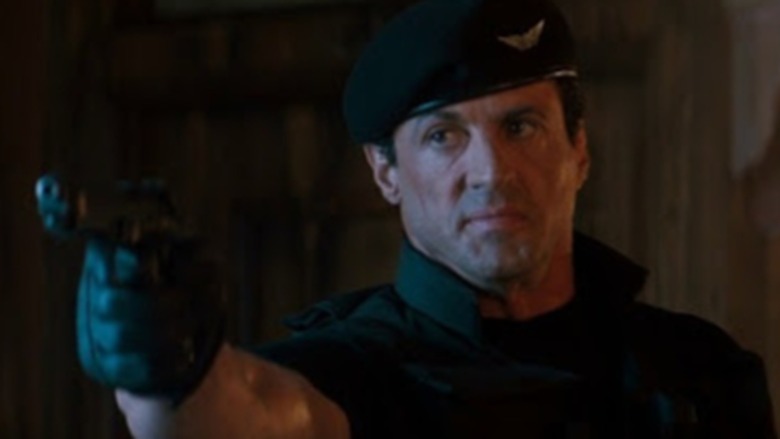The Ending Of Demolition Man Explained
Led by two of the biggest names of the era – Sylvester Stallone and Wesley Snipes – 1993's "Demolition Man" is certainly one of the most unique projects to come out of the decade. Beginning in 1996, the film spotlights bitter rivals LAPD Sergeant John Spartan (Stallone) and crime lord Simon Phoenix (Snipes), whose feud leads to both of their incarcerations. Inmates at the new California Cryo-Penitentiary, both men are frozen in stasis, until 2032 where Phoenix escapes and resumes his path of destruction. The society of the future is ill-equipped to stop him, so it's up to Spartan to save the fictional San Angeles.
"Demolition Man" is jam-packed with action, romance, and even a twinge of comedy, amounting to an overall winning combination. On a budget that sat at roughly $57 million, it left theaters with a hefty $159.1 million gross under its belt. To this day, it stands out as a favorite for Stallone die-hards, in addition to general audiences and critics. It currently boasts a strong 60% on Rotten Tomatoes, and the critical consensus reads, "A better-than-average sci-fi shoot-em-up with a satirical undercurrent, 'Demolition Man' is bolstered by strong performances by Sylvester Stallone, Wesley Snipes, and Sandra Bullock."
In case you need a refresher or have recently given it a go and couldn't quite keep up, here's how "Demolition Man" concludes and what the ending means.
Spartan gives Phoenix the cold shoulder
After being thawed out for a parole hearing, Simon Phoenix breaks free of custody and runs roughshod all across San Angeles. Maniacal as ever, he kills police officers, steals various firearms from a museum, and conspires with the corrupt mayor Dr. Raymond Cocteau (Nigel Hawthorne) to assassinate his opposition. Since the future has eliminated crime and violence, law enforcement is powerless to stop Phoenix, prompting them to unfreeze John Spartan and bring their long-standing hatred for one another into the new millennium. It's a long, dangerous road, but Spartan eventually manages to corner his now physically and mentally enhanced rival.
By the end of "Demolition Man," Spartan and Phoenix engage in their final confrontation at the same cryo-penitentiary they were frozen in. The criminal mastermind attempted to unleash all of his still imprisoned colleagues, but Spartan's quick thinking puts the kibosh on his evil schemes. In a moment of desperation, he uses a chemical agent to freeze Phoenix's entire body in place, preventing him from causing any more trouble. With a skull-shattering kick to the head that would make Sub-Zero from "Mortal Kombat" proud, Spartan brings his nemesis' reign of terror to an end moments before the entire prison goes up in a fiery explosion.
Making compromises
The death of San Angeles' once-beloved leader, Dr. Cocteau, and the destruction of the cryo-prison leave the city's residents in a state of confusion. Not to mention, the collective fear surrounding the Scraps –an underground resistance faction that refuses to adhere to Cocteau's stringent rules — only worsens this anxiety. Though many who thrived under Cocteau's regime fear the collapse of civilization is imminent, there is hope on the horizon. Now that the tyrannical leader is gone, it's time for the people to come together and make a better, fairer system that benefits all.
A major theme of "Demolition Man" is that of power, and how the decisions of few can oppress the will of many. The Scraps, led by Dennis Leary's Edgar Friendly, represent a free, autonomous way of life that leaves everyone's fate in their own hands, unlike the legislation of 2032. Cocteau actively worked to abolish agency in pursuit of peace and safety, which may have come from a good place but didn't align with what a large subset of the population actually wanted. Therefore, those who didn't adhere to his rules found themselves silenced, or in Friendly's case, nearly killed.
Hopefully, sometime in the "Demolition Man" timeline, San Angeles found a happy medium between Cocteau's utopia and the Scraps' desired free-for-all.
Love is in the air
Throughout "Demolition Man," Spartan is tirelessly tracking down Phoenix, but he's not on the job alone. Along the way, he's joined by Lieutenant Lenina Huxley (Sandra Bullock), who is fascinated by him and hopes to educate him on the tenets of 2032 culture. Unsurprisingly, Spartan doesn't take kindly to the banishment of meat, the prohibition of drinking and smoking, and certainly doesn't approve of the outlaw of physical intimacy. Nevertheless, she continues to push modernity upon him, rejecting his outdated philosophies outright as if she could never stoop to such lows.
Though this contrast in beliefs culminates in a handful of disagreements between the two, they don't shut each other out completely. On the contrary, their mutual romantic feelings blossom despite their fundamental differences and the age gap between them that the movie conveniently ignores. By the time the finale rolls around, they're a full-fledged item, solidified when Huxley takes a radical leap of faith and shares a kiss with Spartan to celebrate Phoenix's defeat.
One can only hope that, much like the post-Cocteau society they now live in, the happy couple found common ground between their two polar opposite lifestyles somewhere down the line.
Duties of the badge
For the most part, "Demolition Man" is unapologetic 90s sci-fi fun all the way through, which is what made it such a hit. However, if you begin to think critically about its subtextual messaging, it's clear that there's more to the story than meets the eye. Aside from societal power structures, director Marco Brambilla also explores the role of law enforcement and what the true responsibilities of those who wear the badge are — using Spartan as a vessel to convey each of these concepts in a thoughtful and nuanced way.
Before being put on ice, Spartan earned the nickname "demolition man" since he couldn't care less about what he destroyed if it meant saving lives. Though he gained recognition for his reckless approach, he understood that senseless destruction was wrong. Furthermore, he felt that idolizing someone for their brutish behavior was equally as dangerous, as the support can lead officers to slip further into an excessively violent methodology. He respects his position, knows his limits, and prefers to avoid confrontation altogether if it's a possibility. Simply put, to Spartan, a cop should value human lives above all else and never abuse their authority.
Even though it hit the silver screen nearly 30 years ago, "Demolition Man" is just as topical today as it was back then. If nothing else, it'll keep you thinking long after the credits roll.




